Can biscuits stop global warming? Maybe.
Skyonic has received a $3 million grant from the Department of Energy to create a simulation and study the feasibility of SkyMine, an industrial process it has developed to convert carbon dioxide into baking soda.
If all goes well, the company will then apply for a second grant to build a large-scale facility in which to house the technology. The idea is to build the plant at Capitol Aggregates, a cement plant in San Antonio. It'll be raining pancakes.
Carbon capture and sequestration has been studied for years, but so far most projects have yet to leap off the drawing board. Alberta, Canada has committed $2 billion to large-scale carbon sequestration projects and is currently giving out grants. Most of the Canadian projects will involve capturing carbon and then storing it underground or injecting it into oil wells to get more oils out of the depressurized wells. Oil producers will pay $110 a ton for pressurized carbon dioxide at the tar sands.
Skyonic, Carbon Sciences and Calera all want to take a different tack. These companies believe that by converting the carbon dioxide into minerals, the world can avoid the challenge of trying to store a gas permanently underground. This process would also transform the carbon dioxide into an economically valuable commodity. (Carbon Sciences and Calera want to make calcium carbonates, however, not sodium bicarbonate.) Still, mineralization takes energy, so whether this will all pencil out in the end still remains to be seen.
Skyonic has a great backstory, too. Founder Joe Jones, a chemical engineer, came up with the idea for the company while watching TV with his sons. The Discovery Channel had a show about traveling to Mars, and experts offered up their ideas for getting rid of carbon dioxide. Jones told his sons that the experts had it all wrong. Creating sodium bicarbonate would probably be the best solution.
He then went to his PC and began to research the subject on Google. He didn't find a lot of answers, but one posting referred to a 1973 textbook Jones himself remembered. He'd bought it for a class at the University of Texas. In fact, it happened to be sitting on the shelf right behind him at the time.
He opened it up to the relevant page and there was the passage he wanted, underlined years earlier by his younger self.



